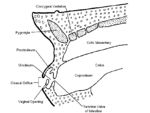Avian Vent and Cloaca - Anatomy & Physiology
Jump to navigation
Jump to search
|
|
Introduction
The hindgut of the avian digestive system terminates in the cloaca. The external opening through which faecal matter and uric acid is excreted is called the vent. The shape of the vent varies depending on species.
The Cloaca
- Divided into coprodeum, urodeum and proctodeum by complete annular folds
- Some urinary excretions arriving in the cloaca become incorporated with the ingesta and move in a retrograde fashion to the caeca, increasing the absorption of water and electrolytes from the urinary waste
- The coprodeum is the most cranial division of the cloaca
- Continuation of the colon where faeces are stored
- Bounded by the coprourodeal fold
- Can be stretched by the faecal pressure so the central opening is everted through the vent
- The urodeum is the middle part of the cloaca
- Caudal to the proctodeum fold
- Uteric opening in dorsolateral wall above the papilla of the deferent duct/oviduct opening
- The proctodeum is the caudal segment
- Short
- Ends at the vent
- Opening in the dorsal wall leads to the cloacal bursa of Fabricus
The Vent
- Horizontal slit
- Phallus of males on internal surface of the ventral lip
- During insemination the vent is inverted
Histology
- Columnar epithelium
- Stratified squamous epithelium at external opening of vent and in the caudal proctodeum
- Broad folds of mucous membrane
- Crypts present which branch near their base
- Lymphoid tissue present in the submucosa
- The fold of mucous membrane covering the entrance to the bursa is composed of columnar epithelium, muscle, connective tissue and goblet cells
- 2 layers of tunica muscularis
- Inner circular
- Outer longitudinal
Species Differences
- Galliformes (turkeys and chickens) can move urates from the urinary tract into the colon and caeca where ammonia is released for protein synthesis
- Small memebrane coveres the opening of the oviduct into the cloaca in ducks, geese and swans until sexual maturity

